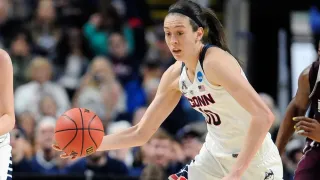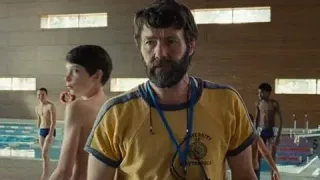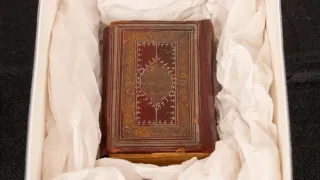July 17, 2023
'Queens of Christmas' BenDeLaCreme & Jinkx Monsoon Announce Holiday Tour
READ TIME: 4 MIN.
It's the most wonderful time of the year...again! You better watch out, you better not cry, because global drag icons and RuPaul's Drag Race stars, BenDeLaCreme and Jinkx Monsoon are coming back to your town with the wildly successful, internationally acclaimed, "The Jinkx & DeLa Holiday Show" (Produced by BenDeLaCreme Presents).
The 30-city international tour marks the duo's biggest tour yet, featuring more cities, more shows, and even bigger theaters (including the iconic Dolby Theatre). The tour will run from November 12 - December 30 across the US, UK, and Canada with a new show written by DeLa and Jinkx that proves they're still the reigning "queens of Christmas'' (Entertainment Weekly). Presales begin July 19 at 10 a.m. local time for the US & Canada and July 26 at 10 a.m. BST for the UK. Tickets go on general sale July 21 at 10 a.m. ET for US & Canada, and July 28 at 10 a.m. BST for the UK at JinkxandDeLa.com.
Following the massive success of four previous holiday tours, and a cult-classic holiday film ("The Jinkx & DeLa Holiday Special," 2020), fans can expect another year of fabulous spectacle, whip-smart comedy, brand new songs, and annual favorites. Join the sugary DeLa and the spicy Jinkx for an evening The New York Times says is "sure to lift your spirits and make you howl with laughter."
And the Daily Beast adds: "In many ways, The Jinkx and DeLa Holiday Show feels like a victory lap for the beloved duo, whose success has gone long beyond the reality TV series that once made them famous."
BenDeLaCreme says, "With all the hatred, darkness, and misinformation flying around our world today, it is an honor and a privilege to spend the holidays with tens of thousands of audience members each year, creating joyous community spaces where we can gather strength through laughter and celebration. Whether you consider it the most wonderful time of year or the most troubling, we're here to tell you... you're right! So let's make it our own."
Monsoon adds, "It's been a wild year, so let's end it wildly. DeLa and I strive to entertain while we enlighten and enliven. The Jinkx & Dela Holiday Show is not only a moment of respite, but also of community, at a time where we need our chosen family and community most of all. So add us to your holiday plans, or let us BE your holiday plans– either way, you're welcome to join us."
BenDeLaCreme and Jinkx Monsoon are the sole writers of their holiday shows, a major achievement for two drag artists who tour at such a large scale. With BenDeLaCreme in the producer and director's chairs, the show is entirely helmed by the queens themselves. Too often, queer and drag stories are written and produced by people outside of the community. The Jinkx & DeLa Holiday Show and BenDeLaCreme Presents are reminders why authentic queer storytelling is not only necessary but should be widely celebrated.
The Jinkx & DeLa Holiday Show is co-written and co-created by BenDeLaCreme and Jinkx Monsoon, directed by BenDeLaCreme, produced by BenDeLaCreme Presents (a company comprised of producers BenDeLaCreme, Kevin Heard, Gus Lanza, and Associate Producer Jin Moon), and promoted by AEG Presents Comedy Division. For more information, and to sign up for updates, visit jinkxanddela.com.
Tour Dates:
November 12 - Glasgow, UK (Theatre Royal Glasgow)
November 13 - London, UK (The London Palladium)
November 14 - Liverpool, UK (Liverpool Olympia)
November 19 - Indianapolis, IN (Clowes Memorial Hall)
November 20 - Cincinnati, OH (Taft Theatre)
November 21 - Toronto, ON (Meridian Hall)
November 23 - Montreal, QC (L'Olympia de Montreal)
November 24 - Montreal, QC (L'Olympia de Montreal)
November 25 - Hamilton, ON (FirstOntario Concert Hall)
November 26 - Buffalo, NY (Shea's Performing Arts Center)
November 28 - Boston, MA (Boch Center - Wang Theatre)
November 29 - New Haven, CT (College Street Music Hall)
December 1 - Brooklyn, NY (Kings Theatre)
December 2 - Richmond, VA (Dominion Energy Center - Carpenter Theatre)
December 3 - Durham, NC (Durham Performing Arts Center)
December 4 - Atlanta, GA (Atlanta Symphony Hall)
December 6 - Pittsburgh, PA (Heinz Hall)
December 7 - Tysons, VA / DC Metro (Capitol One Hall)
December 8 - Philadelphia, PA (Kimmel Cultural Campus - Miller Theater)
December 10 - Chicago, IL (Auditorium Theatre)
December 11 - Minneapolis, MN (Northrop Theatre)
December 12 - Kansas City, MO (The Midland Theatre)
December 13 - Grand Prairie, TX / Dallas Metro (Texas Trust CU Theatre)
December 14 - Austin, TX (Bass Concert Hall)
December 16 - Los Angeles, CA (Dolby Theatre)
December 17 - San Jose, CA (San Jose Civic)
December 18 - San Francisco, CA (The Warfield)
December 19 - San Francisco, CA (The Warfield)
December 21 - Seattle, WA (Moore Theatre)
December 22 - Seattle, WA (Moore Theatre)
December 23 - Seattle, WA (Moore Theatre)
December 24 - Seattle, WA (Moore Theatre) - MATINEE
December 27 - Portland, OR (Arlene Schnitzer Concert Hall)
December 29 - Edmonton, AB (Northern Alberta Jubilee Auditorium)
December 30 - Vancouver, BC (The Orpheum)






